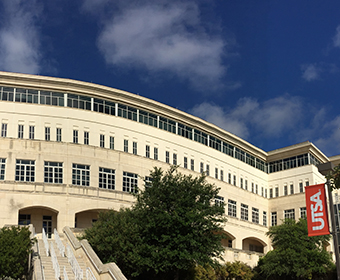
The Biotechnology, Sciences and Engineering Building located on the UTSA Main Campus.
(April 30, 2018) -- In 2017, George Perry, the Semmes Foundation Distinguished University Chair in Neurobiology and dean of the College of Sciences at The University of Texas at San Antonio (UTSA), created a massive open online course (MOOC) focusing on the progression of Alzheimer’s disease from molecular and genetic perspectives. Since its launch, more than 3,000 participants from 130 different countries have participated in the MOOC.
“Alzheimer’s disease is one of the most debilitating diseases of our time and afflicts people all over the world,” Perry said. “This experience has been very successful, with several more participants than we had anticipated, and a very positive response to the lessons. The purpose of the course was to raise awareness about the disease and the impact of a healthy lifestyle on its onset and development. Our students have told us that they appreciated the explanation of changes in the brain that trigger the disease, the status and future directions of the research, and the resources we make available to stay updated on the topic.”
Perry is one of the most prolific Alzheimer’s disease researchers in the world. His Alzheimer’s course, created with collaborator Rudy J. Castellani, professor of pathology and director of the Center for Neuropathology at Western Michigan University, is the first of its kind.
The course, which is fully online and offered free of charge, explores the history of Alzheimer’s disease, identifies the scholars who have made significant contributions to the advancement of research demystifying the disease and provides an understanding of the correlation between clinical disease, morphological changes and molecular pathways. Participants in the course also learn about healthy lifestyle habits to prevent or delay the onset of Alzheimer’s.
“The purpose of the MOOC was to raise awareness of Alzheimer’s disease and the impact of a healthy lifestyle on its onset and development,” Perry said. “Our students have been fully engaged in learning about changes in the brain that trigger the disease, the status and future directions of the research, and the resources we have available to stay updated on the topic.”
The course is crafted to give undergraduate and graduate students a strong understanding of neurodegenerative disease. It also works effectively as an introduction to brain health research, which has a home at UTSA in several institutes including the UTSA Neurosciences Institute, the San Antonio Cellular Therapeutics Institute, the South Texas Center for Emerging Infectious Diseases, the Center for Innovative Drug Discovery and the Institute for Health Disparities Research.
“Online course offerings are increasing around the world,” Perry said. “MOOCs have the potential to transform higher education and project universities into the global arena. Being a word-class education institution requires us to analyze and explore different, innovative approaches for online education and MOOCs are one of those options.”
The course, Understanding Alzheimer’s Disease: A Molecular and Genetic Approach, remains available through August 28 through edX, a massive open online course provider created by the Massachusetts Institute of Technology and Harvard University. It was created in collaboration with the UTSA Office of Online Learning and the UTSA Video Production Group.
UTSA is ranked among the top four universities in the nation under 50 years old, according to Times Higher Education.
Learn more about brain health research at UTSA.
Learn more about George Perry.
Connect with UTSA online at Facebook, Twitter, YouTube, Instagram and LinkedIn.
UTSA Today is produced by University Communications and Marketing, the official news source of The University of Texas at San Antonio. Send your feedback to news@utsa.edu. Keep up-to-date on UTSA news by visiting UTSA Today. Connect with UTSA online at Facebook, Twitter, Youtube and Instagram.
Move In To COLFA is strongly recommended for new students in COLFA. It gives you the chance to learn about the Student Success Center, campus resources and meet new friends!
Academic Classroom: Lecture Hall (MH 2.01.10,) McKinney Humanities BldgWe invite you to join us for Birds Up! Downtown, an exciting welcome back event designed to connect students with the different departments at the Downtown Campus. Students will have the opportunity to learn about some of the departments on campus, gain access to different resources, and collect some giveaways!
Bill Miller PlazaCome and celebrate this year's homecoming at the Downtown Campus with food, games, giveaways, music, and more. We look forward to seeing your Roadrunner Spirit!
Bill Miller PlazaThe University of Texas at San Antonio is dedicated to the advancement of knowledge through research and discovery, teaching and learning, community engagement and public service. As an institution of access and excellence, UTSA embraces multicultural traditions and serves as a center for intellectual and creative resources as well as a catalyst for socioeconomic development and the commercialization of intellectual property - for Texas, the nation and the world.
To be a premier public research university, providing access to educational excellence and preparing citizen leaders for the global environment.
We encourage an environment of dialogue and discovery, where integrity, excellence, respect, collaboration and innovation are fostered.